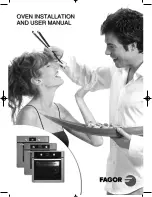
27
GB
Hob
Type of hob
The oven is combined with a hob
that can be made up of two types of
heating elements: cast-iron electric
plates (
see diagram 1
) or glass
ceramic hobs, which may be
traditional (
see diagram 2
) or with
extendable cooking zones (
see
diagram 3
).
Switching on the glass ceramic hob
Traditional cooking zones
Traditional cooking zones are made up of circular
heating elements. They turn red approximately ten
seconds after they have been turned on.
Each cooking zone is fitted with a control knob allowing
you to select from 9 different temperature settings from a
minimum of 1 to a maximum of 9.
Extendable cooking zones
The extendable radiant elements (B) are recognisable by
the fact that they have a double heating zone. You can
turn on only the smaller internal cooking zone or both the
external and internal zones.
The control knob allows you to choose between two
power levels, which are both adjustable between a
minimum value of 1 to a maximum of 9:
The lowest power level can be set by turning the knob
clockwise from 1 to 9.
Turn the knob to completely (
)
)
)
)
)
) until you hear a
slight click, to enable the maximum power level, which
in turn can be adjusted between 9 and 1 by turning
the knob anticlockwise. To restore the minimum power
level, turn the knob and set it back to position 0.
For double cooking zones, the first part of the knob
movement activates the smaller cooking zone (internal).
To activate both (internal and external), it is necessary to
turn the knob completely (
)
)
)
)
)
) and then select the desired
power level between 9 and 1.
Residual heat indicator lights
(only available on
certain models)
The indicator lights (C) indicate that the temperature of
the corresponding cooking zones have exceeded 60°C,
even after the heating element has been switched off.
Recommended power levels for various types of
cooking:
Power Radiant plate
0
OFF
1
To melt butter or chocolate
2 and 3 To heat liquids
4
To prepare creams or sauces
5
To boil meat
6
To cook pasta or rice
7 and 8 To cook meats, fish, omelettes
9
To fry
)
Activation of both cooking zones
Practical advice on using the glass ce-
ramic hob
The glue that is applied on the gaskets leaves some
traces of grease on the glass. Before using the
appliance, we recommend you eliminate these with a
special non-abrasive cleaning product. During the first
few hours of use there may be a smell of rubber which
will disappear very quickly.
To obtain the best results with your hob:
Use flat-bottomed pans to ensure that they adhere to
the cooking zone perfectly.
Always use pans with a diameter that is large enough
to cover the hotplate fully, in order to use all the
available heat.
Make sure that the bottom of the cookware is always
dry and clean to guarantee correct adherence and
long life, not only for the cooking zones but also for
the cookware itself.
Avoid using the same cookware that is used on gas
burners: the heat concentration on gas burners may
deform the base of the pan, causing it not to adhere
correctly.
Never leave a cooking zone on without cookware on it
because as it heats up and rapidly reaches the
maximum level, it could damage the heating
elements.
C
A
A
A
A
C
A
A
B
B
diagram 1
diagram 3
diagram 2
















































